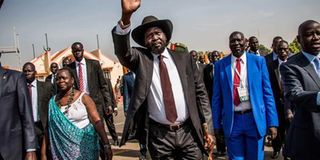Khartoum denies WikiLeaks claim of assassination plot on Salva Kiir

South Sudan President Salva Kiir arrives for a political rally in Juba on March 18, 2015. PHOTO | ASHLEY HAMER |
What you need to know:
- Controversial website says Egypt’s intelligence agency had role in the murder plot.
- These are untrue documents aiming at spoiling ties between two countries, says spokesman.
KHARTOUM
Sudan has dismissed the WikiLeaks report accusing Khartoum and Cairo of a plotting to kill South Sudan President Salva Kiir.
Foreign Affairs ministry spokesman Ali Alsadiq said the claims were untrue, but did not give any details about thousands of other cables published by WikiLeaks last Friday and Saturday
“These are untrue documents aiming at spoiling the diplomatic ties between the regional countries mentioned,” Mr Alsadiq said.
The South Sudan government confirmed obtaining the document, but expressed reservations about it.
“Thank God because we obtained the document, but we don’t have anything to say,” Presidential spokesman Ateny Wek Ateny told the press in Juba.
The Egyptian government has remained silent about the claims.
The controversial Wikileaks website claimed that the Sudanese and Egyptian intelligence planned to assassinate President Kiir.
JOINT PLOT
WikiLeaks published what it claimed to be an official letter by former Saudi Foreign Affairs minister telling the Royal Palace about the plot.
According to the report, the Saudi embassy in Khartoum informed their government that they had received information on a joint plot by the Egyptian and Sudanese intelligence to assassinate President Kiir.
Egypt’s intelligence apparatus, says the report, sent “three of its most dangerous agents” to stay at the Garden City area in Khartoum.
“The aim of sending them to Khartoum was to formulate a joint plan with the Sudanese intelligence for the elimination and assassination of Kiir and some of his aides,” the Saudi embassy in Khartoum reportedly claimed.
Other documents mentioned numerous corruption scandals involving several Sudanese officials, including asking for money from the Saudi government officials.
The Khartoum officials implicated include a former Defence minister and a state governor.
The WikiLeaks documents also mentioned the Iranian military support to Sudan during the war against South Sudan in April 2012 over the oil-rich region of Heglig.
It also discusses the cold relations between Sudan and Saudi Arabia during 2012 and 2013.
South Sudan seceded from Sudan in 2011 following a referendum on self determination.
However, several issues remain unresolved, hence the suspicion between the neighbouring states. They include the border demarcation, wealth sharing and citizenship.
The two states also continue to trade accusations about support to their respective rebel groups.




